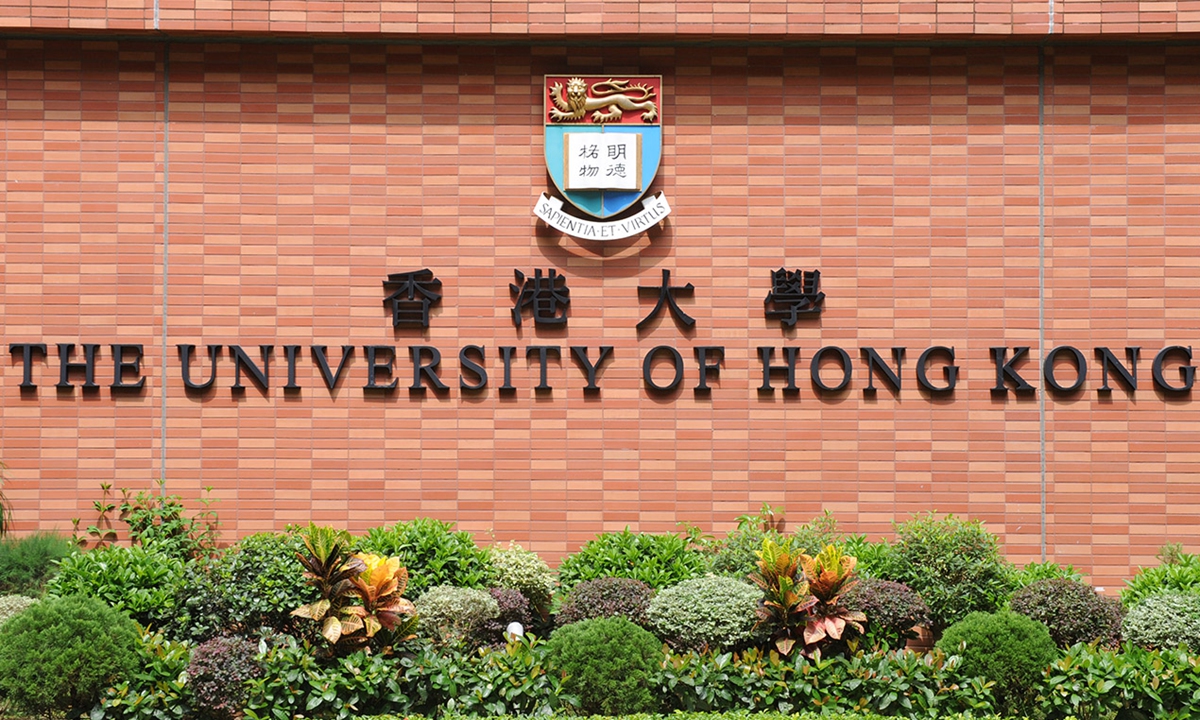Mainland students distressed over HKU's 'hate speech' video
By Xu Keyue Source: Global Times Published: 2020/9/3 21:13:40

The University of Hong Kong Photo: hku.hk
A controversial video produced by a TV station of the University of Hong Kong (HKU) Students' Union has encountered a flood of criticism as it contains "bullying and incites hatred" towards Chinese mainland students under the guise of addressing educational resource allocation problems and exercising the freedom of speech. Experts said the video indicated a severe problem of penetration of secessionist ideas among Hong Kong youth.
The two-minute video is a parody of the university's official welcome film for freshmen. While it is titled Welcome to HKU, the parody described HKU as XGU (University of Xiang Gang), which is pronounced in pinyin (Chinese official spelling system), to satirize the allocation of resources at the university, which it claimed was focused on mainland students.
Captions on the video read "XGU welcomes a new cohort of mainland students & spies of Big Brother" and "Whatever you choose to study, XGU closes its doors to institutional autonomy and academic freedom."
The video not only includes negative characterizations of mainland students, it also tries to support Tai Yiu-ting, a radical Hong Kong anti-government political activist and associate professor in the Department of Law at HKU before he was fired.
Li Xiaobing, an expert on Hong Kong affairs at Nankai University in Tianjin, told the Global Times on Thursday that the stance and view of the HKU Students' Union in recent years have been extreme and chaotic, citing their actions in the illegal Occupy Central in 2014 and the anti-extradition bill protest in 2019, which reflected the secessionist ideas infiltrating young Hong Kong people.
As elite group of young locals, the union, instead of promoting normal exchanges, has escalated conflicts and driven a wedge between students from the mainland and Hong Kong, Li said, expressing disappointment and noting the incident is a typical example.
Members of the Senior Management Team of HKU said they were distressed that the video contains "bullying and hate speech," which "cannot be disguised as freedom of speech and therefore has no place in HKU," said the announcement.
"The video's depictions of a specific group of the university's students were particularly offensive, hurtful, insensitive and unfair. These depictions discriminate against these students solely because of their place of origin…They do not represent the views of the majority of the HKU community," it said.
The video has been removed and the station has apologized on social media platforms, but these moves have failed to satisfy an agitated public.
The station claimed that the purpose of the film was not to attack anyone, but was only political satire and a parody intended to point out a problem of resource allocation on campus.
Meanwhile, the former chief executive of the Hong Kong Special Administrative Region Leung Chun-ying didn't buy the apology. He said on Facebook that "Those who have seen the film know that it clearly intends to target the school and Chinese mainland students. Satire and parody are only their video-making techniques. Using satire and parody as justification is a common practice in Hong Kong media RTHK's 'headline news,' which shows that there is a root cause of the torment that our young students have suffered."
He further noted that freedom of speech around the world has limits and abuse of it has legal consequences. Leung said he hopes students can learn from this case. Leung also questioned whether the Hong Kong Professional Teachers' Union agreed with his comments.
Although removed, the video has had a bad effect on society, and the union should bear its responsibilities for "poisoning young locals' minds, and obstructing Hong Kong's further development."
If the young locals of the union could not reflect on themselves and correct such mistakes with sincerity, they could be left behind by the times, Li warned.
A mainland resident surnamed Zhang, who graduated from the Chinese University of Hong Kong and now works in Hong Kong, said the apology was apparently just an excuse, noting that discrimination by locals against mainland residents in Hong Kong seems to have increased since the COVID-19 outbreak.
"Some locals are brainwashed by Western propaganda and verbally attack mainland people in daily life in the name of freedom of speech," said Zhang.
A mainland student surnamed Liu from the university told the Global Times on Thursday, "The video is not creative, it's discrimination against others!" She said she was heartbroken by such a tone-deaf production.
The official account of the university on Facebook published an announcement on Wednesday condemning the video.
Posted in: HK/MACAO/TAIWAN